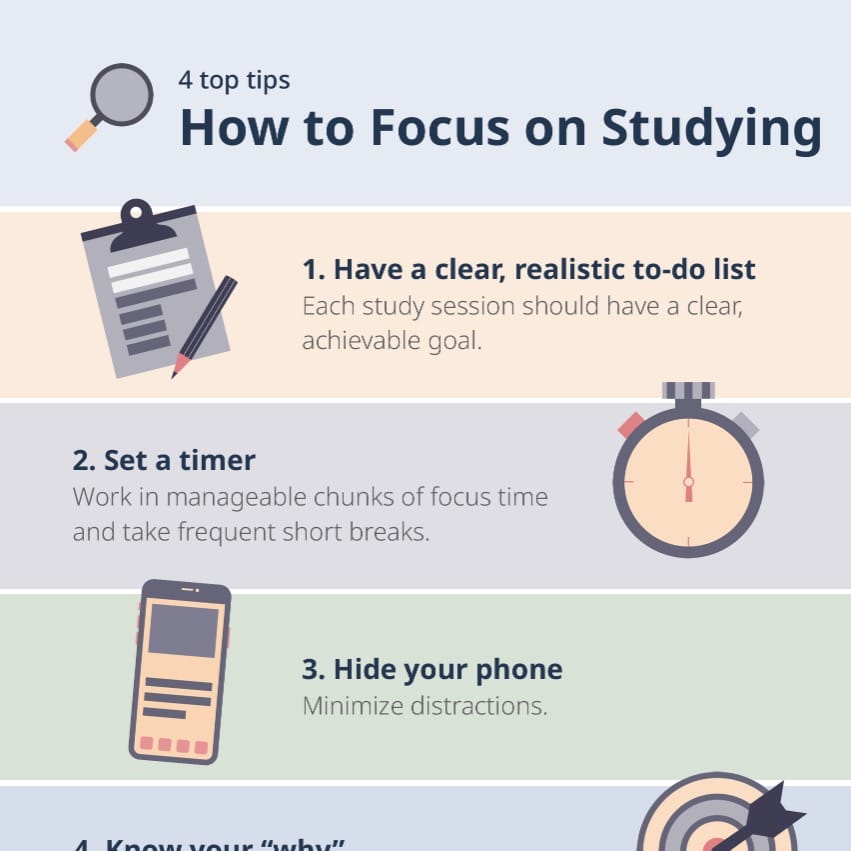How to Stay Focused While Studying: Tips and Techniques for Academic Success
Staying focused while studying is one of the biggest challenges that students face. Whether you’re in high school, college, or graduate school, distractions can easily pull you away from your work. Learning how to stay focused while studying not only helps you retain information but also makes your study time more efficient. In this article, we’ll explore effective tips and techniques to enhance your focus, boost your productivity, and ensure you stay on track during study sessions.

Why Focus is Important in Studying
Focus is the cornerstone of effective studying. Without it, your mind may wander, and you’ll find yourself re-reading material or spending hours on tasks that should only take minutes. When you’re focused, your brain can absorb and retain information more efficiently, making the study session productive and worthwhile.
Being focused allows you to maintain deep concentration, which helps with understanding complex concepts. It also reduces the likelihood of errors and improves the quality of your work, both of which are essential for academic success.
1. Create a Distraction-Free Study Environment
Your environment plays a huge role in how well you can focus. To maintain concentration, it’s important to create a study space that minimizes distractions. This means finding a quiet place where you can study without interruptions from family, friends, or social media.
Tips for a Distraction-Free Environment
-
Choose a quiet space: Libraries or quiet study rooms work great, but if you study at home, designate a specific study area where distractions are minimal.
-
Turn off notifications: Put your phone on “Do Not Disturb” mode or use apps like Forest to block social media and distracting apps during study sessions.
-
Organize your space: Keep your study materials and workspace tidy to avoid the temptation to check your phone or other distractions.
Having a dedicated study space signals to your brain that it’s time to focus, and you’re less likely to get distracted by other activities.
2. Set Clear and Achievable Goals
Setting clear goals for each study session helps maintain focus. If you don’t know what you’re supposed to accomplish, your mind is likely to wander. By setting specific, achievable goals, you give yourself a clear direction and purpose during your study time.
How to Set Goals Effectively
-
Be specific: Instead of vague goals like “study biology,” aim for something specific like “review chapter 4 on cellular respiration.”
-
Break down tasks: Large tasks can seem overwhelming. Break them down into smaller, manageable chunks to stay focused and prevent procrastination.
-
Set a time limit: Give yourself a set amount of time to work on each task. Use a timer or an app like Pomodoro to ensure that you stay on track.
By having clear goals, you give yourself a purpose, which increases motivation and concentration.
3. Use Active Learning Techniques
Active learning keeps your brain engaged and helps retain information better than passive reading or listening. Rather than just reading through textbooks, try engaging with the material in a more interactive way.
Examples of Active Learning Techniques
-
Teach what you learn: Explain concepts aloud, as if you were teaching someone else. This forces you to break down and simplify the information.
-
Practice retrieval: Instead of just re-reading notes, close your book and try to recall what you’ve learned from memory.
-
Use flashcards: Tools like Anki or Quizlet can help you review and test your knowledge actively.
By using active learning, you challenge your brain to recall and apply what you’ve learned, which improves retention and understanding.
4. Take Regular Breaks
Studying for long periods without breaks can lead to burnout and decreased focus. It’s important to give your brain time to rest and recharge. The Pomodoro Technique, which involves working for 25 minutes followed by a 5-minute break, is a great way to stay focused while preventing mental fatigue.
Why Breaks Are Essential
-
Mental recovery: Breaks help you refresh your mind and increase productivity when you resume studying.
-
Boost concentration: After a short break, you’re likely to return to your study materials with renewed energy and focus.
Remember, the key is to make your breaks short but consistent. Don’t let breaks turn into long distractions—set a timer to keep you on track.

5. Stay Hydrated and Eat Well
Your body and mind are interconnected. If you’re dehydrated or hungry, your ability to concentrate will be significantly reduced. It’s important to maintain proper hydration and eat brain-boosting foods to keep your focus sharp during study sessions.
Foods and Drinks That Enhance Focus
-
Water: Drinking enough water is essential for cognitive function. Keep a bottle of water nearby to stay hydrated.
-
Nuts and seeds: These provide healthy fats and protein that help improve brain function.
-
Leafy greens: Vegetables like spinach and kale are packed with nutrients that support brain health.
Avoid sugary snacks or caffeinated drinks that provide temporary energy but lead to a crash later. Focus on fueling your body with nutritious foods to sustain concentration over longer periods.
6. Manage Your Time Effectively
Time management is crucial for staying focused. If you don’t manage your time properly, you might feel rushed or stressed, which can affect your concentration. Using tools like calendars or time-management apps can help you allocate specific times for studying, making it easier to stay on task.
Time Management Strategies
-
Prioritize tasks: Focus on the most important tasks first and leave smaller tasks for later.
-
Use a calendar: Schedule specific study times for each subject or task.
-
Avoid multitasking: Studies show that multitasking can reduce focus and productivity. Stick to one task at a time.
By organizing your study time and focusing on one thing at a time, you will enhance both your focus and productivity.
7. Practice Mindfulness and Meditation
Mindfulness and meditation can significantly improve your focus. By practicing mindfulness, you train your brain to stay present and reduce distractions. Meditation helps clear your mind and enhances your ability to concentrate on your studies.
Simple Mindfulness Techniques
-
Deep breathing: Take deep breaths to calm your mind and reduce anxiety.
-
Focus on the present: Try to bring your attention back to your study materials if your mind starts to wander.
-
Short meditation sessions: Use apps like Headspace or Calm for guided meditation sessions that help clear your mind before studying.
Mindfulness and meditation are great tools to improve concentration, reduce stress, and maintain focus for longer study periods.

FAQs About Staying Focused While Studying
1. How can I avoid distractions while studying?
Turn off your phone notifications, use apps to block distracting websites, and set up a quiet, dedicated study space to reduce interruptions.
2. What is the best time of day to study for focus?
Most people find that they focus best during the morning or early afternoon. Experiment with different times to find when you’re most alert and productive.
3. How can I improve my focus if I’m feeling overwhelmed?
Take deep breaths, break your tasks into smaller, manageable chunks, and focus on one thing at a time. Mindfulness practices and short breaks can help reduce stress.
4. How do I know if I’m studying efficiently?
If you’re focused, following a study plan, and feeling confident about what you’ve learned, you’re likely studying efficiently. Track your progress and make adjustments as needed.
Conclusion
Staying focused while studying is a skill that can be developed with the right strategies. By creating a distraction-free study space, setting clear goals, using active learning techniques, taking regular breaks, staying hydrated, managing your time effectively, and practicing mindfulness, you can enhance your focus and improve your academic performance.
Implementing these strategies will help you make the most out of your study sessions and allow you to achieve your academic goals with less stress. Remember, consistency is key—stick with these techniques, and your focus will naturally improve over time.








